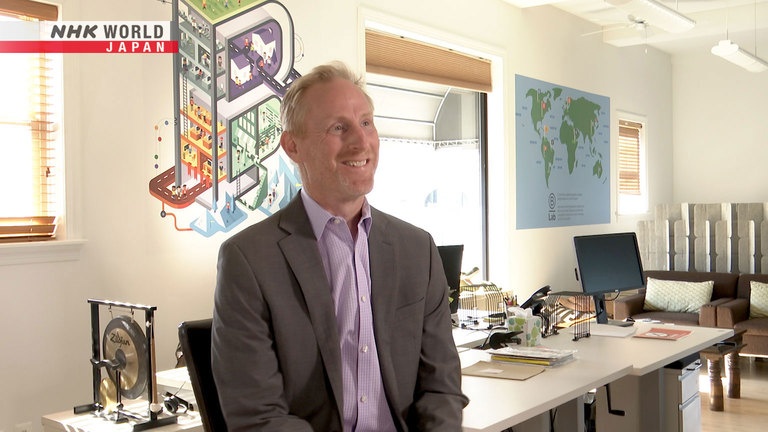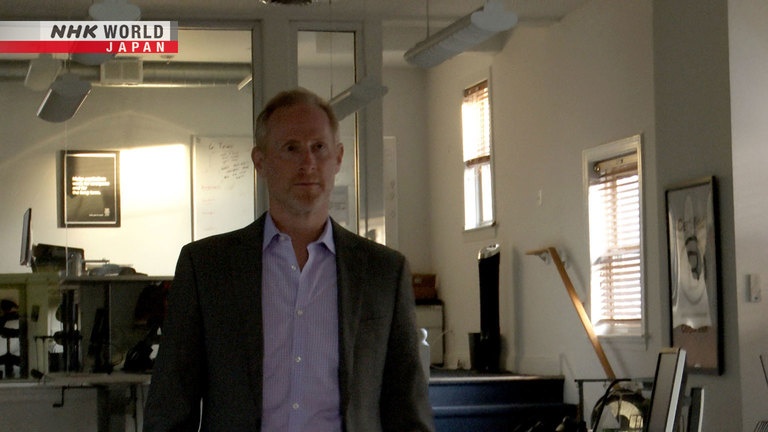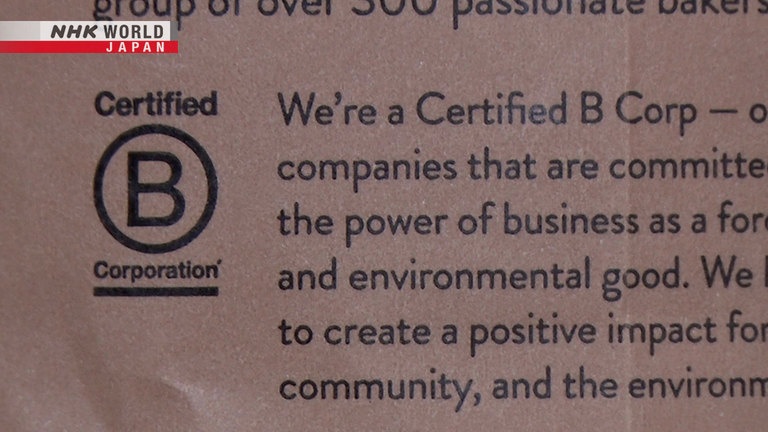A New Model for Capitalism: Jay Coen Gilbert / Cofounder, Global B Corporation Movement
Cofounding an organization which measures companies' impact on society, Jay Cohen Gilbert is working to reshape corporate culture to benefit all stakeholders, from workers to suppliers to communities.



Transcript
Direct Talk
The coronavirus pandemic has highlighted
many social problems around the world,
from unemployment to hunger to racial inequality.
More people are coming to realize that capitalism
which prioritizes the interests
of shareholders alone, is unsustainable.
And corporations have started to
think of benefitting not just shareholders,
but all their stakeholders,
from workers to suppliers to communities.
B Lab is a non-profit organization
which gives a certification to companies that
strive to implement stakeholder-oriented practices.
Making the most of the
renewed interest in stakeholder capitalism,
B Lab's co-founder, Jay Coen Gilbert,
is working to change
the mindset of the business world.
We ask him what companies can do
to achieve good corporate citizenship
in today's environment.
A New Model for Capitalism
Stakeholder capitalism represents
like an evolution in our capitalist system,
that meets the needs of the 21st century.
The 20th century version of capitalism is a
capitalism that we would call shareholder capitalism
where the most important stakeholder
is just the shareholder.
And all of the company's business
and all of our investments
are designed to maximize the returns
for that one stakeholder, the shareholder.
But stakeholder capitalism takes a wider view
and looks at the interdependence of the relationships
between all of the different stakeholders.
But shareholders are clearly,
still important stakeholders.
B Lab takes a detailed look
at a corporation's practices
to verify if it values stakeholders.
It asks about 200 questions,
divided into 4 categories:
corporate governance
treatment of workers,
community engagement,
and the environment.
For treatment of workers, for example,
B Lab asks the company
how many days off an employee can take in a year,
and if it compensates them for education.
Only companies that score a certain number
of points earn a B Corporation Certification.
They are re-evaluated every 3 years.
Certified "B Corporations"
have grown in number to about 5000, in 80 countries.
They come from diverse industries,
from food to household goods, apparel
and even law firms.
Many of them display their B Corp Certification
on their packaging and websites
The B Corp Certification is meaningless
unless there's a rigorous verification process.
So companies can't just like self-report
that they say they're doing something good.
and so the purpose of the B Corp Certification is
to look holistically at the business
and then have that business be assessed
against an independently created set of standards
that represent the full range of ways that
a company can have positive or negative impact
on its community,
on its workforce, on the environment.
If there was one single thing
that we think is most important,
the only thing that every B Corporation must do
is it must make that legal change to their DNA
that says they are now legally accountable
to be a stakeholder capitalist,
not a shareholder capitalist.
And one of the core values
of the B Corporation movement
is this value of continuous improvement.
So everybody meets a minimum bar of
social environmental performance,
and everybody has that legal accountability, but
we all have a lot of improvement that we can do,
cause none of us are perfect.
And so we have a community that
supports each other in getting better every year.
So the biggest advantage for the company is
they get to speak with a very powerful voice
to the next generation of workers
and customers and investors.
In addition to attracting and retaining talent,
some companies are getting access
to lower cost capital,
because the banks feel like working with a B Corp
is lower risk than
working with a traditional company.
Another reason why people become a B Corp
is of course, because consumers increasingly care.
And you'll increasingly see
the B Corp logo on lots of different products.
And that logo becomes a mark of trust.
That I, as a consumer can trust that
company takes its responsibility seriously.
So it also helps with customer acquisition
and turning those customers into like
evangelists for your brand.
After graduating from college,
Jay Coen Gilbert established a successful
basketball clothing and shoe company with friends.
But he was not satisfied with just earning money.
16 years ago, he and his friends set out to
make a positive impact on society in a big way,
by creating the B Corp Certification.
So our first instinct was,
oh, we should use our business
and we should take some of the profits and we
should give them away like as a charitable giving.
But it's actually not
where the most impact of a business is.
The most impact of a business is not about
how much money it gives away.
It's about how it makes its money,
how it produces its product,
who it chooses to employ,
how it treats those people that it employs,
who it uses suppliers,
how they treat those suppliers,
all of those, ones environmental impact, all of
those things are much bigger impact on the world
than just whether it writes a check for charity.
And so, our consciousness was evolving over time.
I've never had an original thought in my life
and B Corp is no different.
And so there were already really pioneering companies.
And so we were quite inspired by their example
and what we were inspired to do was not just to
create one other company that would be like them.
We wanted to help support thousands of companies,
hundreds of thousands of companies
around the world be like them,
which meant how do we make it easier
for companies to follow their lead?
And that meant
marking the trail a little bit better.
If we had any innovation, it was pulling
all that together into a single framework
where we could say, this is the type of company
that we all want to work for and
buy from, invest in and support.
And we're going to give it a name
it's called a B Corp, so it's easier to identify.
And we're going to make sure that B Corp is
something that we can trust and feel good about.
Recently, stakeholder capitalism has received
more attention from the corporate world
because of shifts in societal priorities.
One example is climate change.
People are holding companies accountable for
greenhouse gases and other environmental pollution.
Another crucial issue is social justice.
With the Black Lives Matter and MeToo movements,
companies can no longer ignore diversity.
Although in the last few years,
many companies have adjusted practices,
such as hiring -
Coen Gilbert thinks that change needs to go deeper.
Diversity is really just the first step,
and probably not the most important step,
because we could have more diverse leaders,
but if they're still operating in a system that's
designed only for the benefit of shareholders
then we have new leaders that are in an old system
and they will feel very constrained
and it will be very difficult for them
to operate a stakeholder model,
even if it's different people in leadership.
If the expectations of investors are
just to maximize shareholder value,
but the company wants to maximize
the well-being of all of its stakeholders,
well then they're in conflict.
And so when we look at the economic system,
we have to look at not only the incentives
and the structures of an individual company,
but we have to look at the capital market
and we have to look at other things that actually,
incentivize behavior one way or the other.
But we need to create communities
that are equitable.
We need to invest around for equity
and create communities of belonging,
where everybody feels valued
for their unique heritage and contribution.
The coronavirus pandemic
has also brought social change
with people re-evaluating their working environments.
The pandemic exposed inequity in society,
with low-paid essential workers
putting themselves at risk by going out to work,
while others work remotely from home.
As they re-examined the meaning of work,
many dissatisfied workers
left their employers to find alternatives.
The trend has earned the catchy title
"The great resignation."
I think that the pandemic
has actually just made more clear
things that many already knew were true,
which is we have an economy
that is quite inequitable.
Where a lot of the burden or
the suffering in this case of the pandemic
was borne by those that were most vulnerable.
And so in the US, we call them essential workers,
before the pandemic,
we mostly didn't talk about them at all.
We mostly ignored them,
or we thought of them as disposable.
We thought of them
as an expense that we needed to minimize.
And it's also done another thing,
which is it's had many of us
with lots of more time on our hands
to reevaluate our relationship to work
and to think about what is really important to me.
And I think what we're seeing with
what some call the great resignation
or the great renegotiation
that's taking place is people are
renegotiating their relationship with work.
I think that
the movement towards purpose was already
a decade or more in movement.
I think what the pandemic has done is
it's helped accelerate that movement.
I'd say one of the things that companies can do to
attract and retain employees in this,
in the 21st century,
where people want to connect with purpose
is for companies to recognize that
they have tremendous power in our politics.
And if we're actually going to change the systems
that govern corporate behavior or investor behavior
companies have a really important role to play
in advocating for public policies
that accelerate our transition to
a more humane caring stakeholder capitalism,
and that companies are no longer
just lobbying for less regulation and lower taxes.
And so the companies that embrace
that role of sort of corporate citizenship,
I think are going to attract the most talent
because increasingly people know
that there needs to be a
rebalancing of the relationship
between the private sector
and the public sector and civil society.
Lately, stakeholder capitalism
has become a buzzword
in the mainstream business world.
Even major US corporations have signaled
their commitment to stakeholder capitalism.
As the public conversation has shifted,
Coen Gilbert now wants to
create a mindset for fundamental change.
He believes we, as citizens,
have an important role to play.
Our role as citizens is
to exercise our right to vote
and to make sure that we're voting,
we're voting every day for stakeholder capitalism,
not just on election day.
It's every day when we go to the store
or we shop online.
Every day, when we take our check and
we deposit in a bank, or we make an investment.
Every day, we have a chance to vote as citizens
for an economy that works for all of us.
and so that's the primary way
we can show up as citizens
and really recognize the power
that we have as citizens
to create the economy and the society
that we want is voting at the ballot box
and then voting every day through
all of our purchases, our investments
and where we choose to go to work every day.
The next generation has
an incredibly powerful role to play
in accelerating this transformation
to stakeholder capitalism
and ultimately holding us
all accountable to go beyond words
and to back up our words with actions.
And those young people are the employees
that CEOs are trying to attract and retain.
And those young people are the customers
that those companies are trying to
attract to buy their products or services.
And those young people are the investors
that are going to inherit the largest
wealth transfer in the history of humankind.
And so that younger generation
simply by standing up for their values
and asking those companies that they buy from
invest in and work for to live into those values,
they're going to
completely reshape our economic system.
And that's what I'm most helpful for.
We asked Jay Coen Gilbert
to write down the philosophy
that guides him in challenging
the prevailing economic system.
Curiosity is a superpower.
And what this means for me
is we need to create something
that's never existed before.
We need to create an economy
that's actually designed to work for everybody
and for the long term.
And so since none of us know what that is,
we can't show up
with certainty about our own ideas.
We need to listen to people that aren't like us.
We need to be curious about their perspectives
and their own experiences,
and we need to imagine together
and co-create together, a new economy,
a new kind of capitalism that
works for everybody and for the long term.
Curiosity is a superpower